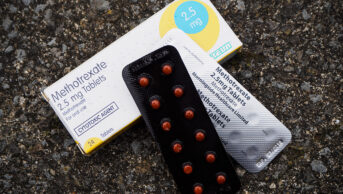Later this year, the Royal Pharmaceutical Society will soon ask pharmacists to endorse revisions to the 2004 Charter, retaining the phrase in the recital “the Society should, for the public benefit, be more appropriately equipped to function as a regulator”. I accept that this recital cannot be altered without seeking a new Charter, but it directly contradicts our President’s promise to “remove references to regulation” (PJ, 14 February 2009, p157).
Some pharmacists have felt considerable disquiet that their wish for a representative body for pharmacists seems to have been ignored. Now the “new” Charter seeks to create another pharmacy body — surely that is a retrograde step. So why make any changes at all? The General Pharmaceutical Council (GPhC) will be established during 2010 and we could simply leave the 2004 Charter in situ. This is a workable solution because a Royal Charter is a permissive document: the Society is permitted, but not obliged, to do the things stated in the Charter. So pharmacists may decide to vote “no” to the proposed Charter changes and they should be reassured that the Society will not be dissolved by this course of action. If only one third of votes cast are negative, these proposed changes will be stopped.
Fatal defect
To my mind, a fatal defect in the Transitional Committee’s prospectus is omitting to explain how its GB-wide assembly and the national boards for England, Scotland and Wales will divide workloads and income. This lack of clarity could be an organisational nightmare, and lead to lack of direction and costly arguments. Who would benefit from having an unelected Assembly that meets just a few times a year, but controls the budgets of the elected country boards? What safeguards would be in place to stop staff of the professional body playing the Assembly off against the boards. In effect Transcom has put the cart of organisational structure before the “who does what” horse, which means that the proposed Charter changes are inappropriate. To be clear, roles, responsibilities and budget allocations must be fully agreed before any expensive organisational structure is created.
I was also surprised that Transcom appeared to ignore the economics of a voluntary membership body. We urgently need a low-cost but effective alternative to creating an expensive, unwieldy, Lambeth-controlled Transcom monster. Currently there is little information on how many people may join the new body. Maybe the number of members voting at elections is an indication of likely numbers? Is 15 to 20 per cent of the current Register realistic? Or will more sign up? Reductions in staff numbers at Lambeth may be required and the only people with safe jobs are likely to be those in publishing or those whose future lies with the GPhC.
A detailed cost analysis, informing us if anyone is willing to pay for services, is urgently needed. Transcom proposed an education faculty in the new body but did the Heads of Schools of Pharmacy agree to pay for it? Would anyone else pay? Will community pharmacists be interested? In future, services will be provided only if there is a viable economic demand, not because the Society does it today.
I am saddened to say that pharmacists should reject these proposed Charter changes. After negative vote, we could amend the Council’s composition through an Order in Council by the Privy Council. This could remove technicians and lay members from the Council. Then, with 17 elected pharmacists on the Council, we should look to the future and agree on our new professional leadership body. Finally, we could petition for a new Charter that does not mention regulation at all.
Creating a new professional body should give us a real opportunity to look forward. I used principles I learnt when practising as a management consultant to develop a “discussion charter” (DC 201X). It is to be posted on PJ Online. First, I identified pharmacists’ view on the branding of the new professional leadership body. Those I spoke to clearly want a body for pharmacists. I suggest positioning the Society as the “professional body for pharmacists”, seeking the title “Royal Society of Pharmacists”. I fully understand that the continued use of “Royal” cannot be assumed and requires approval. However, fallback positions of the “Pharmacists’ Society” or “Pharmaceutical Society” returns many of us to the cherished “MPS” gained at the start our professional lives. I agree with John R (PJ, 21 February 2009, p185) that our professional body should fight to retain the title “pharmacist” for all pharmacists.
Clear aims
Before petitioning for a new Charter, we need clear aims to guide the future professional organisation. Our ethos must be clear with pharmacists’ roles to the fore. We need a manifesto for the 21st century, ideas sadly missing in Transcom’s prospectus. I canvassed other people’s views, and produced the Objects outlined in the Panel. They need further discussion and amendment.
Proposed Objects
- To safeguard, maintain the honour, and promote the interests of pharmacists in their exercise of the profession of pharmacy,
- To represent and lead pharmacists in professional matters, lead the strategic development, ethics and policies of the profession of pharmacy;
- To promote and protect the health and wellbeing of the public through the professional leadership and development of pharmacists and the profession of pharmacy;
- To engage in the wider public debate on health related matters and engage on the role of pharmacy in contributing to the health of the public,
- To maintain, support and develop the science and practice of pharmacy in its contribution to the health and well-being of the public, and
- To promote knowledge of, and education in, pharmacy and its application, thereby fostering good practice and science.
- To provide relief for distressed persons, being (a) members, (b) persons who at any time have been members or have been registered as a pharmaceutical chemist or as a pharmacist, (c) widows, orphans or other dependants of deceased persons who were at any time members or registered as aforesaid, or (d) pharmacy students.
Considering membership, the “pro” pharmacist Council members have worked hard to ensure that pharmacists would be in control if a new body for pharmacy is created. I appreciate their efforts and borrow article 5 from them. Associates, students, scientists and affiliation could be allowed, but only if pharmacists approve. Charter 201X would give the new professional body flexibility to adapt in the coming decades, without any need for a revision each time. In contrast, Transcom fixes the organisation in Charter 2009, without even saying who does what.
In my view, Transcom’s proposal would turn the Society into a body for pharmacy, not pharmacists. Approving the Charter changes means losing the opportunity to have a professional leadership body for pharmacists. There is an alternative to Transcom’s proposal: vote “no”, amend the Council’s composition in the short term, and plan for our future. I hope we achieve a vigorous professional body for pharmacists, returning the Society to its roots and building on its considerable assets.


